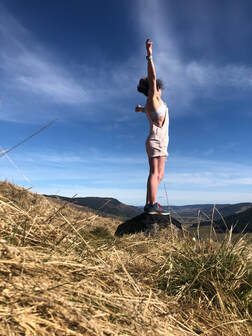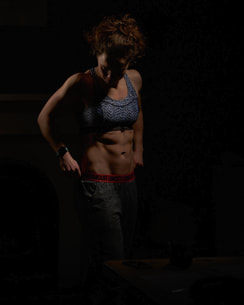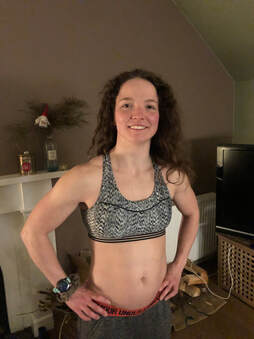
What is super cool, is that this is turning into a conversation athletes can have with their coaches. I mean, it's about fucking time. After recently learning in a bit more depth about how your menstrual cycle can physically and psychologically affect you, it seems completely insane that this was a topic only select coaches would be willing to have a conversation about. I'm gonna go ahead and shift the blame though - I don't believe this is coaches fault, but absolutely society's fault for not making it a normal/comfortable/completely essential conversation to have.
Now the ranty bit is done (sorry) I want to sort of go through what I've learnt just over the last couple of years. Again, this experience is mine - every single female who menstruates will have an entirely different "normal". And that's the main point, really. I've been really put off reading scientific literature about menstruating by the words - which might sound bizarre as I'm quite happy to throw big words around here. But with long drawn out scientific explanations, I often lose the "how does this apply to me" part while I'm trying to understand what's going on. I actually only started tracking my cycle since I began wearing a Garmin fitness tracker - it seemed like a fun bit of information to add at the time. But I started noticing patterns. As an athlete with access to the Scottish Institute of Sport support network, I log my training and perceived load. Combined with also tracking my cycle, I discovered some pretty interesting things.
So a menstrual cycle is something that women live with, all the time - not just during our periods. The first day of a cycle is the first day you start bleeding, and the last day of your cycle is the last day you didn't bleed, before you bleed again. They can be anywhere between 20 and 40 days long. It is normal for that length to change through your life. Different kinds of contraception may alter the frequency and experience of your bleeding. Some women bleed a bit, and some women bleed a LOT. The symptoms that women experience during their menstrual cycle (which again, is all the time) change through their lives, and even vary from cycle to cycle.
So during a cycle (every day for most of our lives) our hormones change. It's not a bad thing, it gives us the ability to create life. It is literally the reason we all exist (close one but not going to start, stay with me!). The three main hormones that are pretty key to the changes we experience are progesterone, testosterone, and oestrogen.
The part of our cycle that society is most interested in (and loves to gaslight us about) is the week prior to bleeding. That's the end of our cycle, so I'm going to start from day 1 (the first day we bleed). On day 1, the start of the first week of our cycle, our oestrogen levels are really low. As we all know from the week prior to the start of our cycle, this can mean (for a lot of women but not always) that we feel fatigued, our concentration levels can be low, and often don't want to be in unfamiliar environments. But in week 1 of our cycle, as our oestrogen levels start to rise, our concentration and energy can flood (excuse the pun) back, and we start to feel more social again. Obviously, combined with mild to severe blood loss, this changes from person to person. You might feel like shit during bleeding, and that is also normal. I never knew this, but if you have any chronic issues such as tendon pain, bowel problems, asthma or insomnia these can manifest themselves with stronger symptoms right before we bleed. But oestrogen is a great hormone, and towards the end of the first week, we should be starting to feel a bit better. Another awesome thing about oestrogen - it helps us build muscle, and during the "rising" phase, it's a good time to consider that resisted exercises with weight and power can progress particularly well at this time.
Part two of constantly being in a cycle is a nice one. Our oestrogen is still rising, and our testosterone too (yes, we have it). On paper, everything during the second week (ish, again, this really depends on how long your cycle is and how much blood you end up losing) is great. Our concentration, reaction speed, memory, patience, and endorphins, are loving life in phase two. The cool thing about endorphins is that for some women, they function as a pain-masking mechanism. For athletes this isn't always great - we rely on being able to listen to our bodies for when we've gone too hard, but our chance of injuring ourselves is also less right now, because testosterone and oestrogen. It's normal to feel more confident, more attractive, and more competitive. One small downside of magical week two, is that because we're sharper, more alert and able to concentrate, is that it can be hard to get your brain to switch off. We're on high alert, looking for a mate, solving every problem that comes to us and also (for me) enjoying going flat out, because we can.
Now, part three. This part is supposed to start on the first day after you ovulate. But who knows when they ovulate? I have literally no idea. There are some subtle symptoms you can look out for, but it's actually really hard to tell without a scan whether or not an egg has travelled from your ovaries to your uterus. We can't feel it. So based on not having access to an ultrasound, I'm going to call it week three, and week three can just be stage three, depending on how long your cycle is. Something else I had no idea about - every cycle, we actually get two dips in oestrogen. The one that most people know about is the week before our period. But the less commonly understood one, is right at the start of phase three. So you might feel a bit shit for a couple of days.
In phase three, our progesterone levels start to rise. Because our body is awesome, it's preparing for the possibility that we may have gotten pregnant during phase two. So as our progesterone rises, we might start to slow down a bit. I get quieter, less interested in being social, and start eating a lot more in this phase. I do keep it clean as much as possible - my mood shifts even more dramatically if I eat a lot of sugar or too much in one go. But I've learnt that if you crave something intensely, it's a good bet that your body needs something of that craving. You can also get a bit constipated during this phase - your body has shifted it's focus from your brain and social productivity to digestion, and absorbing as much as it can from the food you eat. Having both progesterone and oestrogen peaking (because a couple of days after the dip, your oestrogen comes back) means that you burn fat more efficiently. So don't give yourself a hard time for eating a bit more.
Now phase four, the one society really likes to tell us is "a bad week" or "your angry pre bleeding time" or "is it your period soon?" is simply when both your oestrogen and progesterone drop. It is normal to experience no bad mood or symptoms during this week. It is also normal for real, valid things that normally you'd be able to cope with, make you feel more sad or frustrated than you would be in an earlier phase. I personally either want to kill everything I see, eat everything that sits still long enough, or feel cynical and pessimistic with almost no connection to what is happening externally. We had an amazing work week last week; everything went smoothly, we were productive, training was great. And I just felt like shit. There's not a lot you can do about it, other than not guilt-trip yourself for feeling like that. I've found with tracking my cycle, that when I'm prepared it's easier to just feel sad or angry, and know that it's going to go away eventually. It can be really hard to see the light at the end of the tunnel of low oestrogen, but when you have a rough idea of how long it's going to take, it really does make it easier.
I've had cycles where I bleed a lot, and cycles where I experience almost no symptoms. Sometimes our flat is like a walk-in hunger games, and other times the week before my period I get extremely clingy and reluctant to leave familiarity. It's been incredibly valuable to me, to have an external "check" that I can look at, before I react externally to things. I mean, having low oestrogen doesn't mean that problems you have are only "because of hormones". Your own judgement is yours, and if you want to react then I will be the first to stick my hand up and vote for you to go right ahead. But it's been really cool to be able to plan my training around when is going to be the least risky, best possible time for me to be lifting heavy, or going as hard as I can in the boat. At the end of the day, we can't control it - sometimes we have to race when we feel pessimistic, sad and our whole body hurts. But this is the best part - we know very well that we can be our best despite all that. Our muscles don't really change, our ability to concentrate is trained and therefore we can't lose it. So females who made it this far (nice one, thank you) don't worry about it. You know you can do amazing things despite feeling shit. But give yourself a break, and if anyone asks you if you're being moody because of your period, don't waste another cycle minute by dignifying them with a response.


 RSS Feed
RSS Feed
